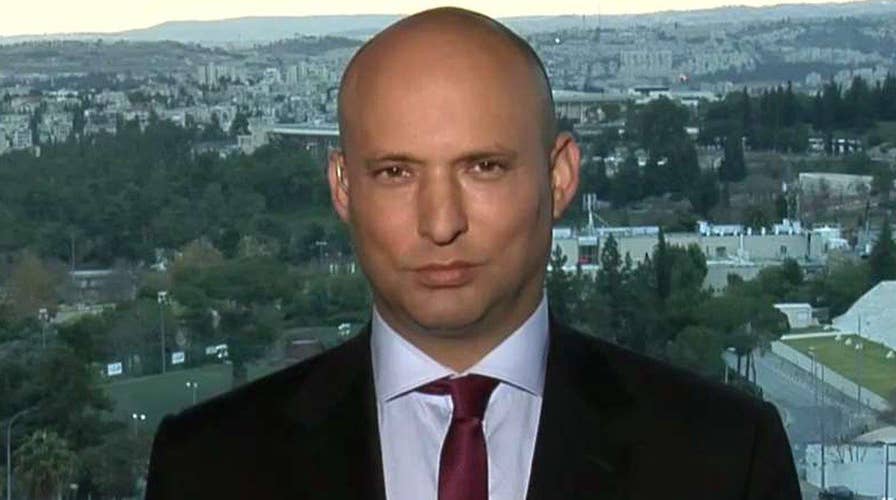Eric Shawn reports: What's next for Israeli peace?
Minister Naftali Bennett on U.N. vote and new proposals
Critics who thought the U.S. opened the UN’s anti-Israel floodgates by abstaining on a vote condemning settlements last week say an obscure subsequent move by the world body to establish a “blacklist” of Israeli companies proved them right.
Lost amid the angry words that followed the Dec. 23 UN Security Council vote that critics called an American betrayal of Israel was a Christmas Eve appropriation of $138,700 to fund a database of companies doing business in the West Bank. The measure puts UN prestige behind the anti-Israel Boycott, Divestment and Sanctions (BDS) campaign, say critics.
“The types of data they are talking about acquiring would be to form the basis for future sanctions against companies that did business on the West Bank,” Fox News contributor and former U.S. Ambassador to the UN John Bolton told FoxNews.com. “That’s the only purpose of it that I can see.”
The request for funding, first adopted last April, would “investigate the implications of the Israeli settlements on the civil, political, economic, social and cultural rights of the Palestinian people throughout the Occupied Palestinian Territory,” which extends to East Jerusalem, and would “produce a database of all business enterprises” working in territories disputed between Israel and the Palestinians.
Bolton said the database is an “effort to lay the groundwork” for the UN Security Council to follow up on its anti-settlement declaration by imposing costly economic sanctions.
Although the Obama administration was widely criticized for not using its Security Council veto power to stop the anti-settlement resolution, it did oppose the General Assembly’s move to create the database.
“In close consultation and cooperation with Israel, we joined the Israelis recently in opposing funding for work related to the database, but this effort, unfortunately, was not successful,” U.S. Ambassador to the UN Samantha Power told FoxNews.com in an emailed statement. “We will continue to strongly oppose, in close coordination with Israel, any additional measures related to this one-sided effort if they arise moving forward.”
The stunning decision by the U.S. to abstain and therefore allow passage of the anti-settlement resolution exposed a deep rift between Israel and the Obama administration. Israeli Prime Minister Benjamin Netanyahu accused the White House of helping to craft and push the resolution, which initially was put forward by Egypt, and then pursued by New Zealand, Malaysia, Senegal and Venezuela.
“There is a structural, institutional bias against Israel and approving money to blacklist the Israeli companies is helping the BDS movement –basically another opportunity for the UN to single out Israel,” former Israeli UN Ambassador Ron Prosor told Fox News. “There is nothing constructive here—this will not lead to anything but more violence in the region.”
Prosor said Israelis will not be the only ones affected by the so-called blacklist. He said Israeli companies employ 30,000 Palestinians in the West Bank, and punishing their employers will hurt them.
U.S. lawmakers on both sides of the aisle have blasted the U.S. role in passage of the Security Council resolution. The House is set to vote Thursday on a resolution opposing it.
“The administration’s stunt at the UN hurt our ally Israel and made peace in the region even more difficult to achieve,” Majority Leader Kevin McCarthy and House Foreign Affairs Committee Chairman Ed Royce, both California Republicans, said in a joint statement.
But Bolton said there is not a lot Congress can do.
“They can express their disapproval, which is helpful politically,” Bolton said. “But I am more concerned about what will happen internationally.”








































